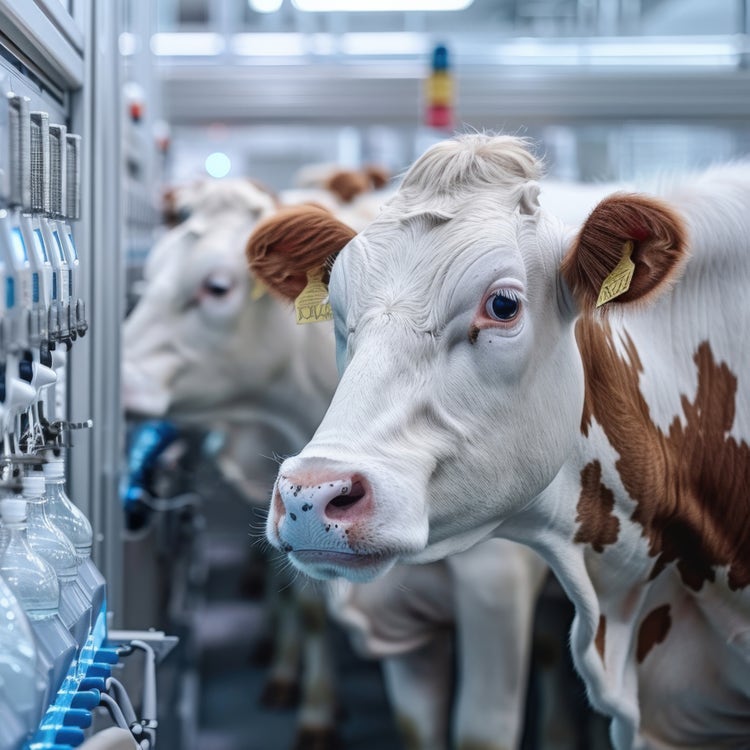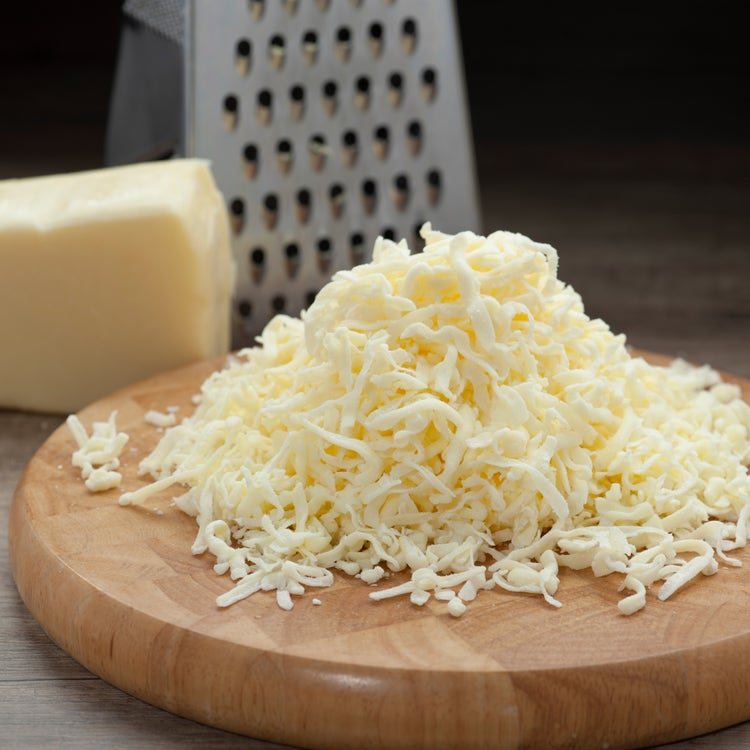
At a glance
The plant-based cheese market is undergoing rapid transformation, driven by consumer demand for indulgent flavor, dairy-free nutrition and clean label ingredients.
Key insights:
- Market growth: The global vegan cheese market hit $3 billion in 2024 and is projected to reach $7.5 billion by 2033, growing at a CAGR of 10.23%
- Consumer drivers: Demand is fuelled by health-conscious, sustainability-focused and ethically motivated consumers seeking dairy-free cheese alternatives
- Performance benchmarks: Texture, meltability, stretch and visual appeal are critical — 69% of consumers rank texture as a top factor in processed cheese purchases
- Ingredion’s solution: TICAGEL® CA 0979 M modified corn starch delivers dairy-like melt, stretch and appearance, outperforming other commercial vegan cheese alternatives
- Innovation frontier: Brands are expanding into regional formats (e.g., plant-based halloumi, feta), convenient applications (slices, spreads) and culinary authenticity to meet evolving consumer expectations
Plant-based eating has moved from niche trend to global shift, reshaping traditional food categories across every aisle. Cheese stands out as one of the most dramatically transformed, driven by consumers who want it all: indulgent flavor and texture, simpler labels and pricing that works.
Today’s consumers aren’t settling. They want the same creamy melt, satisfying stretch and savory bite they’ve always loved — just without the dairy, and with key nutritional benefits, like protein.
For food manufacturers, this presents both a challenge and an opportunity — how to deliver on those expectations using cost-effective, clean-label ingredients. That’s where Ingredion comes in. With deep formulation expertise and a proven broad range of texturizer ingredients with differentiated functionality, Ingredion helps brands create dairy-free cheese alternatives that meet high consumer standards for texture, meltability and visual appeal, without compromising on value.
Understanding the demand for dairy-free cheese
The global plant-based cheese alternate market shift
The numbers tell a compelling story. The global vegan cheese alternate market reached $3 billion (USD) in 2024 and is expected to hit $7.5 billion by 2033, at a CAGR of 10.23%.1
The North American plant-based food sector has experienced 29% growth, with dairy alternatives representing 50% of the expansion.2 This growth reflects fundamental shifts in consumer behavior that extend far beyond dietary restrictions.
Consider the surge in vegan mozzarella style cheese sales across North America. Retailers report consistent double-digit growth in dairy-free cheese alternate categories.3 This momentum creates significant opportunities for manufacturers who can deliver products that meet heightened consumer expectations.
The plant-based cheese alternate market opportunity extends beyond current sales figures. It is a signal — not just of changing tastes, but of a widening opportunity to innovate and differentiate.
Brands that establish early leadership in high-quality alternatives position themselves advantageously as demand continues expanding. Success requires understanding not just what consumers want, but how to deliver it at scale and cost-effectively.
The top purchase drivers for dairy-free cheese alternates
Dietary preferences and health
Health-conscious lifestyles continue to drive strong demand for dairy-free cheese alternatives. On average, 65% of the global population is lactose intolerant,4 making dairy-free options more of a necessity than choice for a large portion of consumers. Dairy allergies further expand the market, creating a clear need for viable, satisfying alternatives.
But it doesn’t stop at medical needs. Many consumers are actively choosing plant-forward diets for perceived health benefits, such as improved digestion, reduced inflammation and overall well-being.
Brands that can deliver rich flavor and creamy texture without dairy are well positioned to earn their trust and their repeat business.
Sustainability and ethics
Environmental concerns are a major driver for today’s consumers, as well. From reducing carbon footprints to improving water efficiency and land use, sustainability plays a central role in purchasing decisions — especially among younger demographics who prioritize climate responsibility.
Animal welfare is another key motivator. For many, choosing plant-based cheese isn’t just about nutrition, it’s about values. Consumers want to support products that reflect their values around humane animal practices, and plant-based alternatives give them that option.
For many brands, the opportunity is twofold: meet consumer expectations and advance corporate sustainability goals.

Price sensitivity and value
Economic factors significantly influence consumer behavior in cheese categories. Research shows that 26% of processed cheese consumers globally are more focused on lower prices than they were two years ago, and 50% of processed cheese consumers globally rank price as one of the top three factors influencing their purchase decisions.5 This price sensitivity creates opportunities for dairy alternatives that offer cost-effective solutions without compromising quality.
Additionally, 75% of food and beverage brands in North America rank "value for the money" as important when deciding which company to source ingredients from.6
Dairy alternatives for cheese have a chance to deliver both performance and value without the volatility of traditional dairy pricing.
Consumer expectations in texture and performance

When it comes to plant-based cheese alternates, texture isn’t a bonus — it’s the benchmark. Meltability, stretch and shredding performance are core functional traits that consumers use to judge quality. These characteristics are directly tied to indulgence and overall product acceptance.
The numbers back this up. Sixty-nine percent of consumers globally consider texture important in processed cheese products.7 For food manufacturers, this highlights the need to match traditional cheese experiences as closely as possible — especially in applications like pizza, where any shortcomings are immediately noticeable.
Meeting these expectations means going beyond basic melt. Successful alternatives need to deliver the signature stretch and melt spread consumers associate with real cheese, along with batch-to-batch consistency that reinforces brand trust and satisfaction.
Common challenges in achieving dairy-like quality in plant-based cheese alternates
Mimicking the complex protein and fat matrix of dairy cheese is no small feat. Dairy’s functional and sensory profile is tough to replicate, and even tougher to scale. The challenge involves understanding how vegan cheese alternate ingredients interact to impact final texture, flavor and appearance. This is where many dairy alternatives fall short.
Poor meltability and spread
Many commercial vegan cheeses fail to achieve complete melt or visually appealing spread when heated. Common issues include rubbery texture or uneven melting. These flaws become especially evident in applications where incomplete melting creates obvious quality differences.
The absence of signature stretch and melt in plant-based alternatives significantly affects consumer acceptance. In applications such as pizza, grilled cheese and casseroles, these deficiencies are immediately apparent. Manufacturers need ingredient solutions that consistently deliver dairy-like melting behaviors and visual performance.
Off-color and unappealing appearance
Visual appeal strongly influences consumer perception of cheese alternatives. Many early vegan cheese alternates exhibited unnatural yellow or grey hues, lacking the traditional white appearance of mozzarella or the rich color consumers expect from cheddar-style products. These color issues signal poor quality or artificial ingredients to many consumers.
Proper browning behavior under heat represents another critical visual factor. Cheese alternatives that fail to develop appropriate color during cooking appear unnatural and unappealing. Consumer perception links proper color development to quality and authenticity, making visual performance essential for market acceptance.
Inconsistent texture and shred
Texture inconsistency remains a major hurdle in plant-based cheese development. Products that are too hard lead to feathering and fines during shredding,8 while overly soft textures create pasty products that resist proper shredding and limit usage.
A lack of desired bite and mouthfeel negatively affects eating satisfaction. Variability across batches also disrupts brand consistency and creates quality control challenges. To succeed, manufacturers need ingredient systems that deliver reliable, repeatable texture performance.
Flavor deficiencies
Flavor development in plant-based cheese alternatives involves complex challenges beyond simple taste replication. Common issues include artificial or off notes, lack of umami depth or inability to carry flavors effectively throughout the product matrix. These flavor gaps become more apparent when products are heated or incorporated into recipes.
Replicating the creamy dairy flavor profile requires understanding the complex flavor chemistry of traditional cheese. Challenges include balancing saltiness and richness without dairy fats while avoiding artificial flavor notes. Successful formulations deliver authentic cheese flavor experiences that satisfy consumer expectations.
Formulating dairy cheese alternatives that bridge the performance gap
How Ingredion's vegan cheese alternate ingredient systems deliver results
TICAGEL® CA 0979 M modified corn starch marks a significant advancement in dairy-free cheese alternate ingredients formulation. Designed to address the most persistent performance gaps, this innovative ingredient system helps brands meet consumer expectations with greater ease and confidence.
Backed by science and tested under rigorous conditions, TICAGEL® CA 0979 M modified corn starch ensures consistent performance across applications. This enables manufacturers to achieve optimal meltability, proper texture and visual appeal while maintaining clean label positioning and cost optimization goals.
Benefits extend beyond texture improvement to encompass broader manufacturing advantages. Clean label compatibility supports consumer preference for recognizable ingredients. Simplified formulation reduces development complexity and time-to-market. Cost optimization opportunities help manufacturers balance performance with economic requirements in competitive markets.
Validating performance against dairy benchmarks
Comprehensive testing demonstrates TICAGEL® CA 0979 M modified corn starch performance against established dairy benchmarks. Melt spread testing shows TICAGEL® CA 0979 M modified corn starch delivers results comparable to dairy mozzarella. Hardness levels land in the ~5 kg range, ideal for shredding. In side-by-side stretch tests, plant-based cheese made with Ingredion’s solution achieved the kind of visual melt fusion and texture that consumers associate with indulgence.
Performance validation provides manufacturers with confidence in ingredient system capabilities. Improvements in stretch and eating experience demonstrate clear competitive advantages. Manufacturers using Ingredion's ingredient systems achieve visual consistency and familiar cheese appearance in finished products.

Real-world application: Vegan mozzarella style for pizza
Why mozzarella is the ultimate test
Pizza is where plant-based cheese alternates prove their worth. Among all cheese applications, mozzarella sets the highest performance bar. Its need for meltability, stretch and golden browning under high heat creates a demanding benchmark that challenges even the most advanced ingredient systems.
Consumer expectations in pizza are especially high. Every imperfection in melt or texture is immediately apparent. Additionally, mozzarella holds the largest share of global cheese consumption, and achieving standout performance here can unlock significant market potential across multiple categories.
Brands that succeed with plant-based mozzarella style signal technical excellence and a serious commitment to quality. That success builds credibility and opens doors to innovation across broader product lines.
Direct comparison: Ingredion vs. commercial cheese alternatives

Direct comparison testing reveals significant performance advantages for formulations using TICAGEL® CA 0979 M modified corn starch versus other commercial alternatives. Melt tests show that Ingredion’s solution achieves shred fusion, desirable blistering and melt characteristics comparable to dairy cheese — a benchmark many commercial plant-based samples fail to meet.
Color is another standout advantage. Ingredion’s formulation maintains a consistent, dairy-like white appearance, directly addressing the off-color issues common in other vegan cheese alternates. This helps deliver the visual appeal consumers associate with quality mozzarella.
What’s more, these performance advantages aren’t limited to mozzarella alone. The same foundational principles and ingredient capabilities extend across shredded, sliced and specialty plant-based cheese alternates, making it easier for brands to scale quality and consistency across product lines.
What's next in plant-based cheese innovation
The next frontier in plant-based cheese alternatives lies in specialization, versatility and global relevance. As consumer expectations continue to rise, demand is shifting toward cheese alternatives that go beyond imitation and offer culinary authenticity — solutions tailored to distinct regional tastes, cooking styles and cultural dishes. From plant-based feta style suited for Mediterranean meals to dairy-free halloumi style crafted for grilling in Middle Eastern cuisine, the opportunity to create targeted, locally inspired formulations is expanding.
Innovation is also moving toward new formats and functions. Beyond pizza and shredded cheese, the market is calling for sliced, spreadable and ready-to-use applications — products designed for convenience without sacrificing performance. The evolution of cheese sauces, dips and heat-and-serve components opens new pathways for brands to differentiate in both retail and foodservice sectors.
Meeting these emerging needs will require more than incremental change. It will demand forward-looking collaboration. Ingredient suppliers and food manufacturers who co-create with agility and shared insight will lead the next wave of breakthroughs. As consumer habits evolve and the competitive landscape tightens, the ability to adapt quickly with science-backed solutions will define success.
Ingredion Idea Labs®
Ingredion remains focused on that future. Through continued investment in R&D, consumer insights and advanced formulation capabilities at our Ingredion Idea Labs® innovation centers, brands gain access to the tools and expertise needed to lead, not follow, the next chapter in the plant-based cheese alternates market.

Delivering dairy-free cheese alternates without compromise
Dairy-free cheese alternates no longer mean sacrificing taste, texture or cost. With the right ingredient systems, manufacturers can deliver high-performing, plant-based alternatives that meet today’s consumer expectations.
Ingredion's solutions address the core challenges — meltability, firmness, appearance and affordability — empowering brands to innovate with confidence.
Ready to explore what's possible? Partner with Ingredion today and discover how advanced ingredient systems can unlock new market opportunities in the rapidly growing world of cheese alternatives.
Meet the Expert
Related Content & Resources
Uncover more Cheese and dairy related articles to help elevate your next product launch.

Cheese
With Ingredion expertise and our plant-based proteins portfolio, we're ready to help you stand out in this growing dairy-free market

Plant-based dairy alternatives
Ingredion empowers you to craft superior plant-based dairy products with clean labels and consumer appeal

Dairy applications
Discover how Ingredion can help you overcome dairy formulation challenges with consumer insights and innovative ingredients
References:
- Global Vegan Cheese Market Report, IMARC Group, 2024
- Ingredion proprietary research, Formulating Consumer-Preferred Vegan Cheese, 2021
- Vegan Cheese Market Outlook, Grand View Research, 2024
- Lactose Intolerance, National Center for Biotechnology Information, 2023
- Ingredion proprietary research, ATLAS Global Consumer Research, 2025
- Ingredion proprietary research, ATLAS Global Consumer Research, 2023
- Ingredion proprietary research, Texture Global Consumer Research, 2024
- Ingredion proprietary research, Formulating Consumer-Preferred Vegan Cheese, 2021
The INGREDION, INGREDION IDEA LABS, TICAGEL and SOLUTION GURUS marks and logos are trademarks of the Ingredion group of companies. All rights reserved. All contents copyright © 2025.
Product availability may vary by region. Please contact your Ingredion representative for details specific to your area.
.